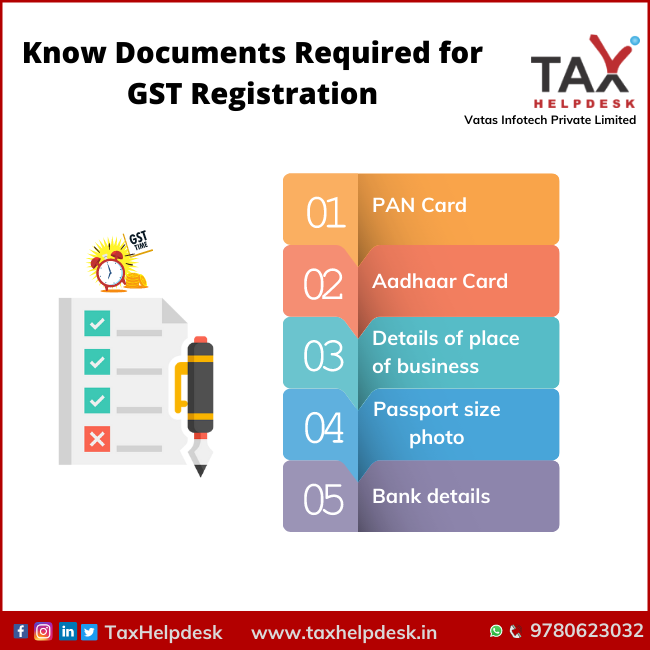Navigating the Complexities of GST Registration: A Comprehensive Guide for Entrepreneur
Navigating the intricacies of GST registration can be a difficult task for many local business owner, as it entails a myriad of guidelines, guidelines, and processes that need to be followed. With the ever-evolving landscape of tax laws, making certain compliance and understanding the details of GST registration is important for the smooth procedure of any company. From determining qualification and collecting the necessary documentation to enhancing procedures for maximum efficiency, this thorough guide aims to supply entrepreneur with the understanding and tools needed to browse the intricacies of GST enrollment effectively.
Qualification for GST Registration
Entrepreneur must meet specific standards to determine their qualification for GST registration. Generally, businesses with an annual turn over surpassing a certain threshold are required to register for Product and Provider Tax (GST) This limit differs by nation, however it is vital for business owners to stay notified regarding the certain laws in their jurisdiction. Furthermore, organizations associated with interstate supplies, ecommerce, or the arrangement of particular specified goods and solutions may also be mandated to register for GST, regardless of their turnover.
In addition, businesses that are signed up under any type of previous tax regime, such as Barrel or service tax, are typically needed to transition to GST registration. By sticking to the necessary standards, services can efficiently browse the complexities of GST enrollment and operate legally within the tax framework.
Records Required for Registration
To complete the GST enrollment procedure, businesses need to gather and submit a comprehensive set of documents. The key files required for GST registration generally consist of evidence of service enrollment or incorporation such as the Certification of Unification, collaboration deed, or any kind of other enrollment certificate.
Moreover, certain records connected to the nature of the business, such as a checklist of items or services supplied, HSN codes for goods, and SAC codes for solutions, might be needed - Why choose CFO Account & Services for GST registration in Singapore. It is crucial for organizations to make sure that all documents submitted are exact, current, and in the prescribed format to avoid any type of delays or complications in the GST registration procedure
Refine of GST Enrollment
Having actually put together the requisite paperwork, companies proceed to initiate the GST registration procedure by engaging with the on the internet site marked for registration. This online website is the Goods and Services Tax Obligation Network (GSTN) site, which works as the key system for all GST-related activities in India. Upon accessing the portal, organizations are called for to fill up out the GST registration type with exact information regarding their organization tasks, turnover, and other pertinent information.
As soon as the form is finished and sent on the portal, the GSTN click here now confirms the details supplied by the business. If any type of inconsistencies are found, the applicant may be needed to supply additional info or explanation. Following successful verification, a GST enrollment certificate is provided to business entity. This certification contains a special Item and Services Tax Identification Number (GSTIN) that is utilized for all GST-related transactions.
It is essential for businesses to make certain that the details provided throughout the GST registration process is exact and up to day to prevent any type of possible issues or delays in getting the GST registration certificate.
Comprehending GST Conformity

Companies require to be familiar with the numerous GST conformity requirements based on their turn over, nature of products or solutions, and the states in which they operate. It is crucial to stay updated on any kind This Site of changes in GST regulations and guidelines to stop any non-compliance problems.
Non-compliance with GST laws can lead to significant penalties, fines, and even lawful effects. Therefore, services should invest time and sources in informing themselves and their team on GST conformity. Looking for professional help from tax consultants or experts can also help in browsing the intricacies of GST conformity and making certain that companies run within the legal framework.

Tips for Optimizing Service Operations
For boosted efficiency and performance in organization procedures, calculated planning and structured procedures are crucial parts. One tip for optimizing service operations is to take advantage of technology efficiently.
Another essential facet is focusing on jobs based on their significance and deadlines. By developing a clear hierarchy of jobs and establishing sensible timelines, businesses can make certain that critical tasks are finished in a timely manner. Furthermore, promoting a culture of open interaction and cooperation amongst employee can result in boosted performance and innovation.

Final Thought
Finally, navigating the complexities of GST registration requires a clear understanding of qualification criteria, necessary records, enrollment processes, and conformity needs. By adhering to these standards and enhancing business procedures, local business owner can guarantee smooth operations and compliance with the GST regulations. It is vital for services to remain informed and updated on GST guidelines to prevent any charges or lawful problems.
The crucial records required for GST enrollment normally include proof of service enrollment or consolidation such as the Certification of Incorporation, partnership action, or any other enrollment certification.Having actually set up the requisite documents, companies continue to initiate the GST enrollment procedure by engaging with the online site marked for registration. Upon accessing the portal, companies are needed to fill up out the GST registration form with accurate information concerning their company check this site out tasks, turn over, and other pertinent details.
In order to preserve adherence to GST guidelines and stay clear of penalties, organizations should focus on understanding GST compliance. By adhering to these guidelines and enhancing business procedures, service owners can make sure smooth operations and conformity with the GST policies.